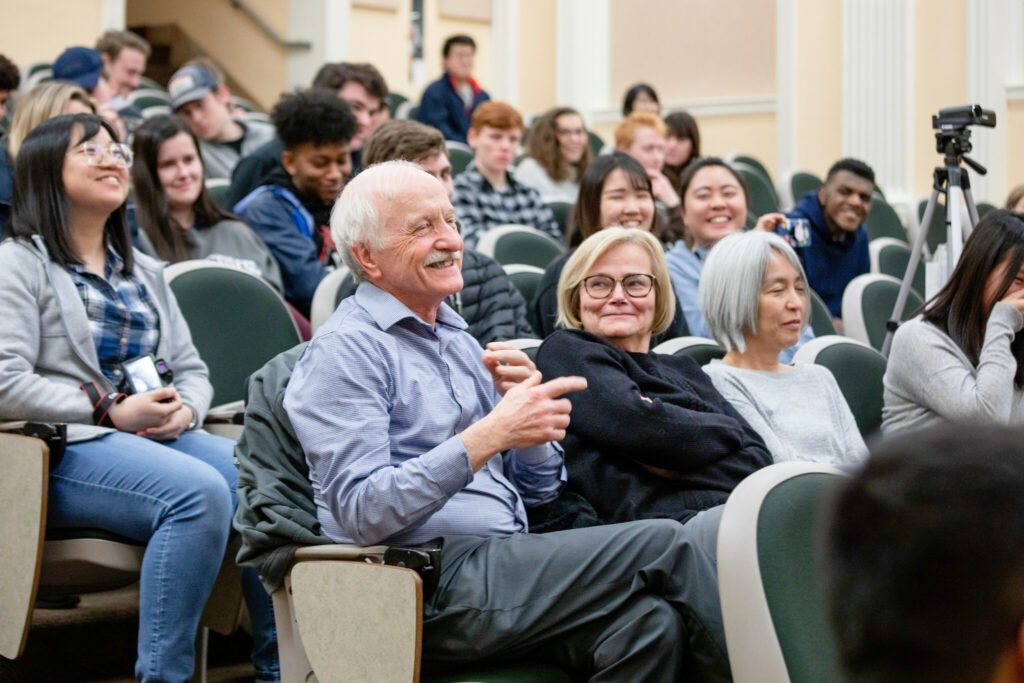Teacher-Scholar Legacies: Stewart Carter

By Megan Francisco, Assistant Professor of Music, and Elizabeth A. Clendinning, Associate Professor of Music
After a distinguished career marked by dedication, leadership, and a lasting impact on colleagues and the community alike, Dr. Stewart Carter is entering a well-deserved retirement. As we reflect on Stew’s 43 years at Wake Forest, we honor not only a brilliant musician, professor, and dedicated mentor but also a colleague who never missed a chance to crack a joke and lift our spirits with a well-timed laugh.

From a young age, Stew’s love of music was palpable. He initially dreamt of being a high school band director, a passion that led him to major in music education at the University of Kansas. Following graduation and his subsequent master’s degree, Stew joined the U.S. Army band as a trombonist and served for three years before transitioning to become an elementary music teacher. However, he quickly realized that he wanted to pursue a career in higher education and went on to get his doctorate from Stanford University. Stew then traveled from state to state — teaching at colleges in Arizona, Kansas, and Ohio — before finding his home at Wake Forest in 1982.
When reflecting on his early career at Wake, Stew chuckled as he reminisced about the days without email. He focused on developing relationships with his colleagues, which led him to many enduring friendships. He and his wife, Selina, grew an early music instrument collection including recorders, sackbuts, viols, and more. Stew also spent several semesters teaching overseas in the Wake houses in Europe, which he cited as some of his favorite experiences as a teacher. Perhaps most memorably, Stew began a “Kansas Day” tradition in the department, on which he celebrates the great state of Kansas through themed snacks, trivia, and cake. Although he claimed that he started it as a joke, the tradition endures to this day. And yet, despite his many contributions, Stew maintains that Wake Forest has not changed much in the past 43 years.
Stew’s passion for early music and the wide world of musical instruments proved infectious to students across majors and years of study. He brought music majors and minors into the world of pre-modern Europe, not only bringing historic sounds to life, but vividly animating connections between music, religion, politics, visual art, and society. In the Collegium Musicum ensemble, students not only got to try their hand at historic instruments but also expanded their extant repertoire as percussionists, organists, and even bagpipers. In collaboration with Jack Dostal, Stew’s Physics of Music course helped students understand the scientific properties of sound and the instruments that Stew so loved. Recurrent partnerships with the Lam Museum of Anthropology and the Moravian Music Foundation additionally gave students opportunities to travel beyond the classroom.
As a scholar, Stew’s research in organology (the study of musical instruments) expanded the field. Writing on his influence, fellow musicologist Tim Carter stated, “the great significance of Stew’s contributions is beyond compare.” Aside from his many articles and edited collections on the subject, Stew has dedicated over 30 years of his career serving as editor of the Historic Brass Society Journal. It is his book, The Trombone in the Renaissance: A History in Pictures and Documents (2012), however, that Stew cites as his greatest career achievement.
Following decades of research into early European instruments, Stew’s interest in instruments led him to a new area of scholarship: Chinese music. In 2000, Stew and Selina traveled to Taiwan to coach early music ensembles and observe Chinese orchestras in action. This trip inspired him to begin researching Chinese instruments and auditing Mandarin, which led to a grant allowing Stew to spend a month in China meeting with instrument makers, orchestra directors, and performers alongside a Wake Richter scholar. Even now, he continues to research alongside Wake students, sharing his knowledge and inspiring them to continue researching Chinese music. Current senior Haozhen Xu, who collaborates with Stew on the translation of early Chinese instrument documents, reminisced, “Dr. Carter has been a great mentor to me — I deeply admire his transcultural perspectives and expertise.”
Beyond his own teaching and scholarship, Stew worked tirelessly to serve his professional communities. At Wake Forest University, he served as Department Chair of both Music and East Asian Languages and Cultures, as well as on numerous other committees, including the Faculty Senate. He brought both diligence and humor to these roles — for example, when he’d overlooked a small matter as department chair, he was known to smile and say, “That’s the first mistake I’ve made all year!” His service work within his professional societies was equally notable; near the end of his career, he was recognized with lifetime achievement awards from both the American Musical Instruments Society and the Society for Seventeenth-Century Music.
But the extent of Stew’s leadership was embodied not only in the formal roles he took on but in the small ways that he helped colleagues in musicology within and beyond the campus community. For example, as department chair, he fought for both the department and the University to acquire the University’s Balinese gamelan — the first University start-up funds awarded to support the work of a new faculty member in the arts, which yielded an expansion to the University’s offerings in music and global studies. He treated not only fellow professionals but also students as colleagues, encouraging several generations of musicologists to establish themselves in the profession.
What will change for Stew in retirement? Not much, he hopes; he plans to maintain a busy schedule of research, editing, and travel. When it comes to basketball, he plans to come to “just a few” games — especially if there are free tickets!
In the words of former student and musicologist Jeremy Sexton, “In his bounty of kindness, generosity, and infectious curiosity, Stew represents all that is best in the humane traditions of the liberal arts.” Even as we congratulate Stew on his retirement, we will deeply miss these qualities that have deeply enriched our Wake Forest community.

